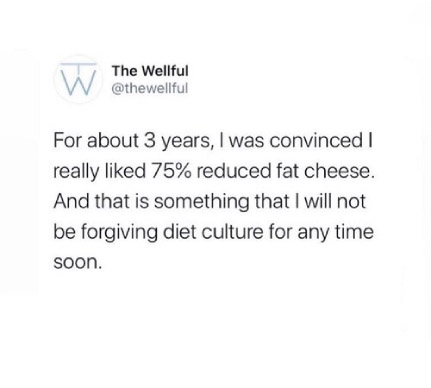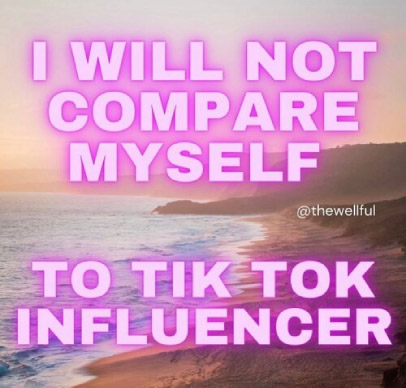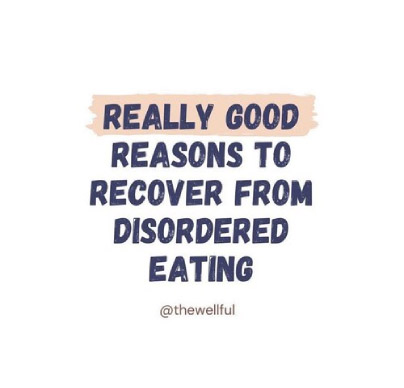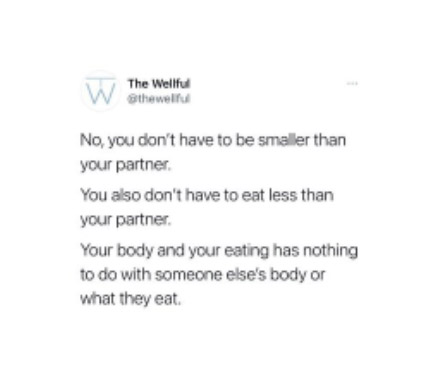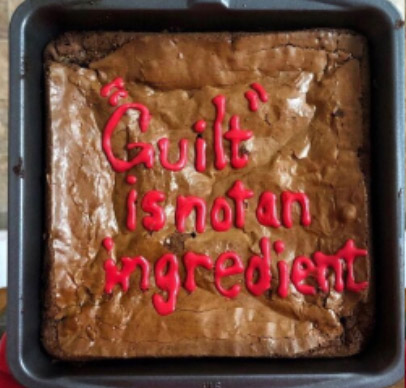This is an article we’ve wanted to write for a long time: how to support a friend if you’re concerned about their relationship with food or worry they might be struggling with an eating disorder.
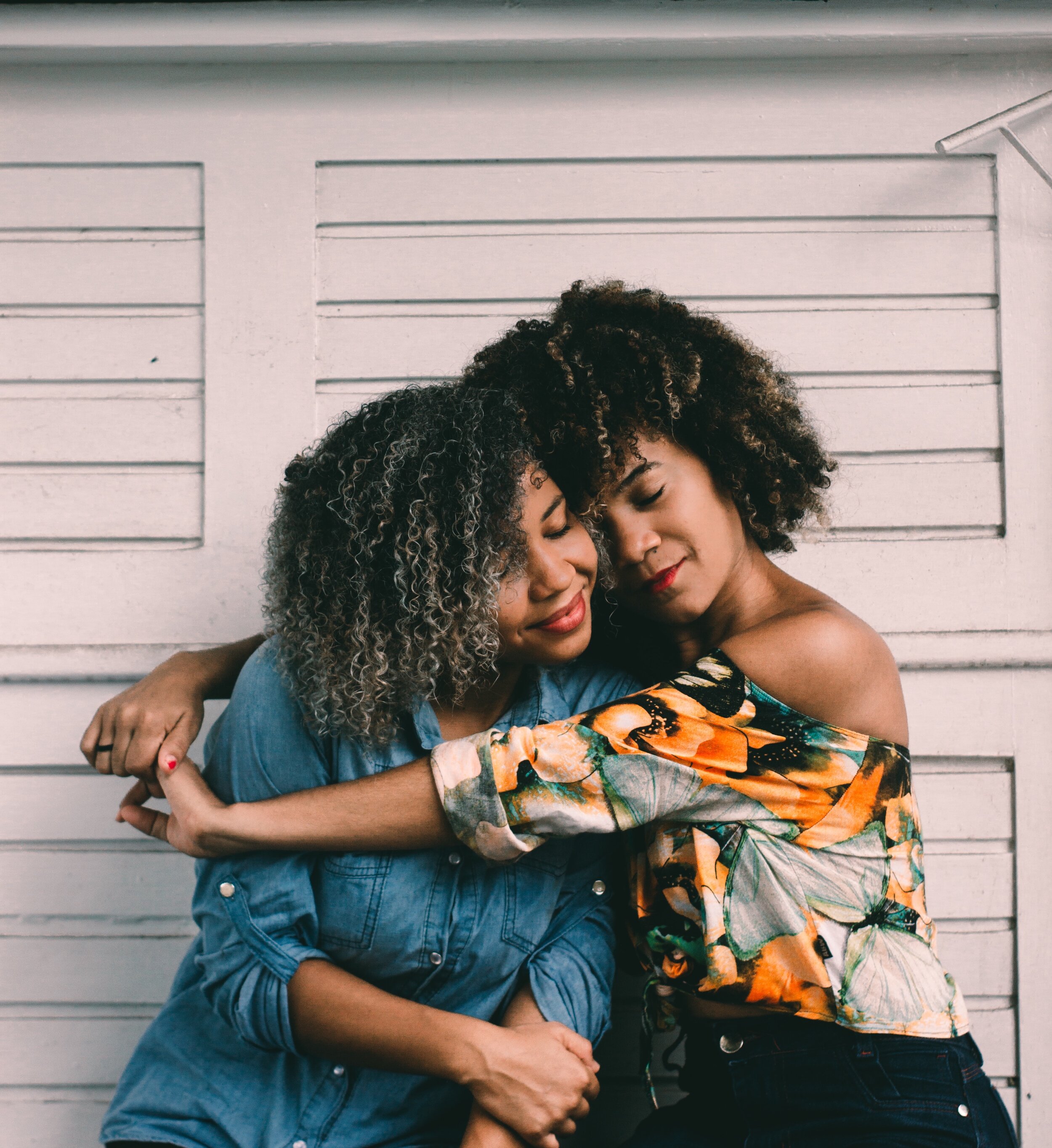
We live in a society that praises disordered behaviors around food and exercise. 2019 has been a year of breaking some of the silence and stigma around mental health, eating disorders, weight stigma, the diet industry and more. On social media we’ve seen campaigns like @i_weigh, articles like Smash the Wellness Industry and books like The F*ck It Diet by Caroline Dooner or Anti-Diet by Christy Harrison (coming 12/24). Some of the hardest, most personal work is off social media, in working on our own relationships with food and supporting those around us with theirs.
According to the National Eating Disorder Association, “By age 6, girls especially, start to express concerns about their own weight or shape. 40-60% of elementary school girls (ages 6-12) are concerned about their weight or about becoming too fat. This concern endures through life.” Our socially accepted conversations and behaviors around weight, dieting and thinness mean we will all likely to be in a position, personally or through friends, of supporting someone struggling with their relationship with food. Though we are all exposed to and affected by the pressures and negative effects of diet culture and shaming around weight and health, we do not all develop eating disorders. NEDA clarifies, “Eating disorders are not a choice. They are complex medical and psychiatric illnesses that patients don’t choose. They are bio-psycho-social diseases, which means that genetic, biological, environmental, and social elements all play a role.” Whether you meet the criteria for a diagnosable condition or not, you deserve help if you want or need it and there are many specialized and credentialed professionals ready to support you.
As a friend, you can also be there to support your friends and loved ones.
What are some of the signs your friend may be struggling with disordered eating or an eating disorder?
-
Skipping meals
-
Cutting out foods/food groups
-
Counting calories
-
Working out to compensate eating
-
Restricting and/or bingeing
-
Fixating on what, how much and when they’re going to eat
-
Making constant comments about their own and other’s weight
-
Increased negative body image and diet talk
-
Embracing or falling for the ‘wellness diet’
What can you say?
Be there. It’s not your job to take on the role of their therapist or dietitian – you’re their friend and someone who knows and cares about them. By acknowledging them – without placing blame, judgment or assuming a diagnosis – you can create a safe space for them to open up or support them in getting help. Try to bring up the conversation with compassion, kindness and in a neutral space ie. not right before dinner but maybe, over coffee or when you’re hanging out and catching up. Registered Dietitian Elizabeth Adler who specializes in eating disorders, women’s health and gastrointestinal concerns suggests saying something along the lines of, “I have noticed that you make a lot of negative judgments towards your body. Do you want to talk about it?” or, “It seems that you are having a hard time finishing your meals. Is there anything I can do to support you?”
Laura Cipullo, Certified Diabetes Educator, Certified Eating Disorder Registered Dietitian, Registered Yoga Teacher and owner of Whole Nutrition Services in NYC and L’ifestyle Lounge in New Jersey, says “Have a heart to heart conversation. Sit with your friend and tell them how important they are. Do not discuss weight. Rather, share your observations not judgements about their mood or behaviors. After sharing, give your friend or loved one the space and or time to respond.”
If your friend remains closed and unwilling to share, Cipullo suggests, “You can respond by saying, ‘I am here for you if at any point you want someone to listen or just want a hug.’ When you show unconditional love and support towards, you are letting the friend/loved-one know they are not alone.”
“You can respond by saying, ‘I am here for you if at any point you want someone to listen or just want a hug.’ When you show unconditional love and support towards, you are letting the friend/loved-one know they are not alone.”
What can you do?
We all experience pressures and messages encouraging us to diet, be thinner and feel obsessed with our food choices (hi @ spring break diets, ‘summer bodies made in the winter’ slogans and ‘cheat’ meals). The first thing you can do to support others in having a positive relationship with food and their body, is to work on your own. Not only does this set an example and support those around you, it also can help you be more resilient to the messages of diet culture.
1. Change the way you talk about food
The language you use to talk about your own food and body tells others it’s okay to talk that way about themselves too. “Try incorporating more neutral language around food & exercise. For example, during a dessert outing, it is sometimes seen as very normal to say ‘I’m so bad for eating that’ or ‘I need to go to a workout class tomorrow because of this.’” says Adler. “Instead, celebrate the taste of that food without judgment, and acknowledge how enjoyable, fun, or special it is to spend time together. If your friend shares feelings of guilt after eating a food, you can support them by sharing that you understand this is bringing up judgmental thoughts, and that it is also okay to enjoy the food and have fun together during this outing.” Notice how you changing your language around food impacts those around you to change theirs.
2. Switch up your appearance/weight-related compliments
Greeting someone with “have you lost weight?” or “you look so skinny!” are compliments we’re all conditioned to feel good about. They mean we look good, right?! The reality is these comments equate beauty with thinness and reinforce the idea that being smaller, taking up less space and losing weight (no matter the context) = beauty and health. You don’t know WHY someone’s weight is changing and you could be accidentally complimenting their eating disorder, illness, depression, etc. The best way to avoid this is to: just not comment on the weight of others. In reality, don’t you want to say that your friend IS beautiful and share all the other things you love about them, not just congratulate them for taking up less space. Look, it’s not to say that you can’t tell your friend they’re pretty – but are you also complimenting other things about them? Some non-appearance related compliments are:
‘I love being around you’ ‘You light up the room’ ‘You can always make me laugh’ ‘My favorite thing about you is how passionate and determined you are’ ‘You are so driven, I’m inspired by you.’ ‘You make me feel so comfortable to be myself’ ‘I love spending time with you, even when we do nothing.’
3. Notice how you talk about your body and weight
When you make negative comments about your own body or weight – you are also making a comment on everyone’s body and weight. Have you seen the Dove body image videos? How we talk to ourselves is how we teach others to talk to to us, and themselves. If you’re tempted to make a negative comment about your body, PAUSE. Think about what you actually need right now. Maybe it’s validation, or noticing physical or emotional discomfort, maybe it’s some compassion for yourself because being a human is hard some days. Try to take a breath and think about what you actually need, then think about how you can ask for support without first tearing yourself down. If you don’t know where to start, follow these positive health accounts and influencers.
Adler says, “When we challenge feelings of guilt, shame, inadequacy or a need to compensate for what we have eaten, we are allowing for a more compassionate, enjoyable and positively memorable experience around food and the body. By modeling this type of relationship with food and your body, you can encourage your friends and loved ones to practice mindfulness and self-compassion skills.”
How can you show support to someone with an eating disorder?
Cipullo says, “If the eating disorder has already been identified, the best recommendation I can give to a family member or friend is to listen and give lots of hugs. Create a safe space for sharing and help the individual get expert help from a healthcare professional specializing in eating disorders. You can identify this type of professionals by the credential CEDS or CEDRD (certified eating disorder specialist/RD). This credential is earned through the Intentional Association of Eating Disorders Professionals.”
If you or someone you know is struggling, you can find more resources and a 24/7 hotline at nationaleatingdisorders.org (NEDA).





